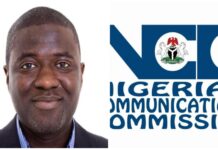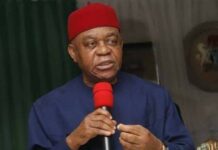The grading, penultimate week, of Dr. Ngozi Okonjo-Iweala as 33rd out of 50 most valuable personalities in the world represents something more than just a profiling of Nigeria’s Coordinating Minister of the Economy, writes Correspondent, SAM NWOKORO.

Last week, Fortune (from the famous Time magazine’s stable) placed Nigeria’s Finance Minister, Dr. Ngozi Okonjo-Iweala, on number 33 out of 50 world personalities it evaluated their worth to humanity of our present age.
Here is what the publication said about her: “A magna cum laude Harvard grad who holds a Ph.D. from MIT, Okonjo-Iweala has helped usher in a GDP-trebling decade of Nigerian prosperity. She is a fearless promoter of sound economic policies,” says Witney Schneidman, a former deputy assistant secretary of state for African affairs.
No wonder Nigeria’s two-term finance minister – and first woman in the role – has been considered a top contender to run the World Bank one day.
Fortune magazine has gained global acceptance as the mirror through which people the world over access valuable information and profiles about those who make decisions that affect their lives in their various callings. It was founded in 1929by Henry Luce, the publisher Time. The media group is largely responsible for rousing the consciousness of western nations against the racist regime in South Africa in the dark days of apartheid, especially in the 80s, of Pieter Botha and Frederik W. de Klerk.
Time’s incisive reportage of South Africa’s barbarism and the many sit-tight military juntas which strutted the African landscape in the 70s and 80s quickened European and America’s stand-off against racist policies in South Africa, rallied concerted economic blockade against the white supremacist regimes of Botha and De Klerk, especially, and eventually caused the apartheid government to agree to Nelson Mandela’s demand that his release from Rhode Island prisons could not commence unless all traces of apartheid laws were expunged and a non-racial universal suffrage general elections is scheduled.
Students of history and political science believe unanimously that the dethronement of apartheid in South Africa owes so much to the power of western media than the filibustering resolutions of then Organisation of African Unity (OAU), then manacled by ideological manipulations from Washington and the former Union of Soviet Socialist Republics (USSR). It was the peak of cold war and the quest for expansion of satellite outposts.
Thus, the western media have since the libertarian age of the later part of the 19th century influenced the course of political and social events in Africa, and so know more than the local media in African countries what even goes on in their respective countries.
In a country like Nigeria, where sundry factors affect media standard of judgement and agenda setting, it has been a bit pesky for the media to make a unanimous or even a near credible appraisal of any public officer. Due to serial betrayal by past governments, Nigerians had become somewhat untrusting of even the best of noblest intentions from their leaders. Which is why it may not surprise many Nigerians that – never mind all the bad slogans assailing everyone from the country’s rambunctious public office-seekers – the country parades some of the brightest leaders whose worth and contribution in redirecting Nigerians’ beleaguered lives are being recognised and appreciated abroad.
According to news reports, Okonjo-Iweala has been named one of the 50 greatest leaders in the world by Fortune magazine. She was recognised alongside others such as Liberian President Ellen-Johnson Sirleaf, Pope Francis, Chinese President Jin Ping, Indian Prime Minister Narendra Modi, Bill and Melinda Gates, as well as Facebook Founder, Mark Zuckerburg; and Apple CEO, Tom Cook.
The Minister was described as “a fearless promoter of sound economic policies”. The citation on her further noted that “she worked hard to usher in a decade in which the country’s GDP trebled”.
Fortune magazine’s annual listing, which celebrates men and women who are transforming lives in all spheres including government, business and philanthropy, explained that in compiling the 2015 list, it gathered advice from more than 24 of the world’s best minds, and that “the leaders were judged by their actions within their professional domains, industries or governance”.
It said further: “To make this roster, it was not enough to be brilliant, admirable or supremely powerful; we set out to find singular leaders with vision who moved others to act as well and who brought their followers with them on a shared quest. We looked for effectiveness and commitment and the courage to pioneer.”
A life of service
Okonjo-Iweala came to Nigeria at a moment it appeared no one around had the leverage to do those things she did for her country. She came into Nigeria’s public service in 2003 after the general election that ushered in Olusegun Obasanjo’s second term as civilian head of state.
It appeared to Nigerians that four years of democratic dividends had been wasted by a man who thought the best way to solve economic problems was by chasing civil protesters about with horse whip. But social problems, especially those that touch on the stomach, don’t require cane to treat. They required just meal on the table or coins in the wallet. None was available to the Nigerian masses as at mid-2003. The economy had no direction, no plan. Local and foreign debts piled up.
The past military regimes before 1999 had fed fat on “servicing debt” through various debt buy-back and oil swap scams. Yet, not even the interest on those debts was paid. Though crude oil was selling, sometime up to $100 per barrel, nobody knew exactly what was being done with the money. Only President Obasanjo, who also doubled as Petroleum Minister, knew everything about oil revenue, how many signature bonuses that were being signed (from 1999 to 2003), how many barrels that were being lifted, etc.
Militants were on regular protest and kidnap-for-ransom became their stock-in-trade, due to lack of care and attention. Sometimes, they were visited with military battalions, instead of responsible dialogue. The institutions were weak. The revenue collection agencies of government had a lot of leakages. There were little mechanisms for saving money, apart from foreign reserves. Worst, key development enablers like infrastructure had not been addressed. The government needed to free itself from the fetters of foreign debt, otherwise there would not be money to pay local contractors – some owed since the conduct of the 1999 elections, let alone address other macro-economic problems.
It was in this area that the former director of World Bank official leveraged on her goodwill to get the London and Paris club of creditors to consider Nigeria’s about $34 billion foreign debt as bad debt. She advanced the argument to her audience and they reasoned that since those debt were not secure enough (as they accumulated during mainly military regimes whose excesses, by nature, could not be checked), there was no need belabouring the new civilian regime with development obstacles.
Debt write-off
Dr. Chuks Osuji, a political scientist and public relations consultant, said: “The debt write-off was the genesis of Nigeria’s economic recovery. It helped Nigeria redirect capital homeward because Nigeria was spending so much on servicing foreign debt. And once you are heavily indebted, there is no way your currency can be strong. It is even more painful for an import-dependent economy as Nigeria. If not for the fact that we earn substantial amount from crude sales, the foreign debt of $34 billion alone would have been enough to bring down the Fourth Republic because a lot was being spent on servicing debt.
“It was the campaign for debt forgiveness which Dr. Okonjo-Iweala spearheaded that gave Nigeria breathing space to pay local contractors, implement the minimum wage of N18,000, increased states’ allocation and even tinkered with the idea of Excess Crude Account (ECA) savings.”
Similarly, economist, Keith Muhakanizi of Ugandan Central Bank, said: “Nigeria has recorded a milestone in the debt relief under Okonjo-Iweala. She has been a good ambassador of the country.”
Then, Obasanjo was also elated for the feat.
“This debt relief offered to us, I am pleased and proud, is the direct effort of our relentless and persistent endeavour over the past six years. What we have achieved now is worth celebrating because what we will expect at the end of the exercise will be close to a relief of $20 billion, which is well beyond the total revenue of Nigeria,” the then president enthused.
Innovative policies
The Finance Minister is credited with many innovative policies. The ECA, which was a saving kettle for the margins of crude sales off budget benchmarks, has helped Nigerian leaders since Obasanjo’s tenure meet up with unanticipated exigencies not captured in annual budgets. The savings from this kettle were used in various times to contain natural disasters such as flooding in some parts of the country and fast-track healthcare programmes, among other contingencies. Records also had it that the Millennium Development Goals (MDGs) programmes were funded at certain times from the fund.
Another innovative policy design of the minister was the Sovereign Wealth Fund (SWF), which was created to tackle huge infrastructural projects. The SWF has been a source that complements the Subsidy Reinvestment and Empowerment Programme (SURE-P) since 2012. Such high level federal projects as ports dredging, highway construction and airports remodelling are being done from the SWF, at least some most pressing.
Commenting on the fiscal policies of the federal government under Okonjo-Iweala, Paul Nwabuikwu, a senior special assistant to the minister, explained in an article published recently that the Nigerian economic space has been widened since the minister’s innovative policies.
“Many sectors have been formalised and empowered through state funding. This is in pursuit of the United Nations mandate on Millennium Development Goals. From the agriculture sector to the textile, to entertainment and oil and gas, there is no sector that is not benefitting from direct state bail-out. Only recently, the federal government set up N213 billion intervention fund for the power sector which has been successfully privatised. It has not been done in this part of the world before. The economy has been made more inclusive than we have ever had, only now requiring Nigerians to tap into these soft windows. The public service is not supposed to be seen as employment generation agency.”
Other innovative fiscal measures noticeable since the woman’s service in Nigeria is the prompt payment of fuel imports bills and the absence of long queues and prolonged scarcity that used to characterise fuel distribution in Nigeria.
But by far, the former World Bank MD’s contribution to the Nigerian economy is the volume of foreign capital that had come into the economy in the past six years.
“Dr. (Mrs.) Okonjo-Iweala has leveraged on her status in the global finance system to attract quite a good dose of multilateral assistance and direct investments in the country. The adoption of private-public partnership (PPP) in the execution some capital-intensive projects which ,contracts were recently awarded, is in realisation of the weakness of the local banks in financing these capital projects, especially at these times of falling oil prices, said Jude Anosike, an economist.
Anosike said the recent recognition of the finance minister by Fortune magazine is a plus on the nation’s sovereign rating.
“In African proverb, there is a saying that wherever the king is, is his palace. What it means is that any commendation on the Minister of Finance about her policies is a compliment on Nigeria’s economy. We know that in recent time, the price of crude oil, the country’s main foreign exchange earner, has taken a nose-dive. Nothing much is coming from there anymore.
“But I can also tell you that the government under President Goodluck Jonathan and his economic managers fairly anticipated this problem and started earnestly to prepare soft-landing for the economy, otherwise the situation could have crippled the economy totally, considering the speed with which the price was tumbling,” Anosike added.
He said the macro-economic policies so far enunciated under the Jonathan administration are fundamentally irreversible and were the most viable options so far.
“The policies were inclusive enough. Only within a short while, they will start yielding big benefits,” he further said, citing the agricultural policies and the power sector reforms.
The recent floating of infrastructure bank for financing big time projects are worthy innovations which will broaden access to finance by venture capitalists, Anosike added.
Setting the pace
The recognition of Nigeria’s finance minister as the 33rd of 50 most effective world leaders is interpreted in diplomatic circles as a credit to the outgoing government under which she served. It is also seen as a further endorsement of the country’s march towards attaining the status of 20th largest economies in the world by 2020, some five years away, if those policies are consistently pursued.
In the world of diplomacy, not much talking is done, but important messages are most times delivered by some little actions.
Coming shortly after Nigeria’s general election of March 28 that brought in a new president in the person of Muhammadu Buhari, who is due for swearing-in on May 29, the recognition of the finance minister could be interpreted as a message to the incoming government to sustain those creative policies which holds the key to Nigeria’s sustained economic growth.















